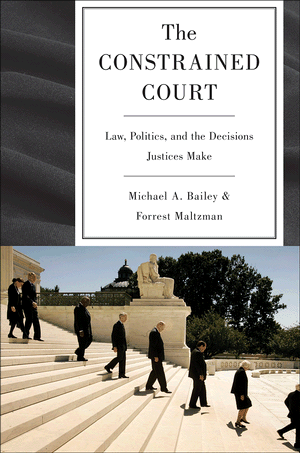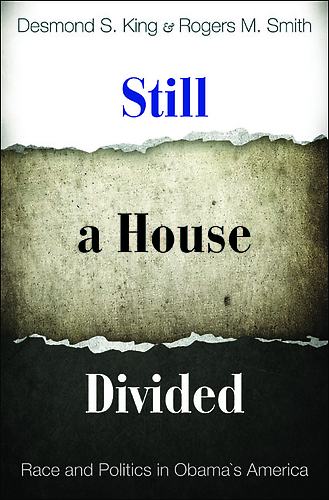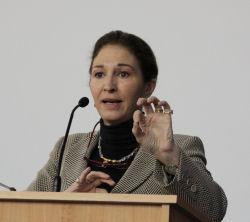
The U.S. Supreme Court and health care
Obama’s landmark health care reform legislation was perhaps the most consequential social policy change in the U.S. in several decades. And we now know that whether it will fully go into effect will depend on the views of the nine unelected, life-tenured justices of the Supreme Court. After Bush v. Gore and Citizens United many Court observers have become jaded, viewing the Court’s actions simply as extensions of politics. This view has a strong pedigree in political science and, if it is correct, it’s pretty easy to predict what will happen to the health care law: down it goes. Four justices are solidly conservative and there is little doubt about their policy preferences. A fifth, Justice Kennedy, is a …

The Politics of Race: Book Launch for “Still a House Divided” by Desmond S. King & Rogers M. Smith
On Friday, 11 November, 2011, Nuffield College hosted a panel of scholars in the field of American politics, identity, and race, to discuss the September 2011 publication of Still a House Divided: Race and Politics in Obama’s America by Desmond S. King and Rogers M. Smith. The dialogue that ensued engaged the authors with a series of questions surrounding the book’s central thesis: despite the real progress in racial equality achieved by the 1960s civil rights legislation, the United States political institution has been caught in between two modes of conceptualizing, and enacting policy, about race— both of which have failed to close the tremendous gap in racial disparities in social and economic welfare that are a legacy of American …

American Conservatives in Crisis?: a Q&A with Oxford’s Gillian Peele
Only three years ago, pundits and political scientists saw the 2008 American presidential election as the beginning of a new era in Washington: the rise of President Obama and a strong Democratic majority in both houses of Congress meant that after eight years away from Pennsylvania Avenue, liberals could again implement political programmes and reforms free from Republican meddling. It provided an opportunity for a fresh progressive platform and created a new mood unlike any since the early years of the Clinton administration, or maybe since the dawn of the Great Society in the 1960s. The conservatives, meanwhile, were in despair; heavy losses darkened the mood and they saw Obama as a charismatic leader who would be difficult to beat, …

Political Paralysis: Reflections on the Republican Party’s Hold on America
Big vs. small government, Blue vs. Red states, the Union vs. the Confederacy: each of these pairings represents different iterations on a recurring theme in the history of American politics. Now, more than ever in recent memory, these competing ideologies are emerging as polar opposites that threaten to drive the US political establishment into a stalemate. For progressives, there is the warranted fear that this deadlock is quickly devolving into a zero-sum game, in which the extreme conservatism of the Right has already won. As I watched the Tea Party-sponsored Republican debate, I was disturbed by the lack of compassion for the disadvantaged touted by several of the candidates, Ron Paul in particular. Bolstered by applause from the audience, …
Why Reinhold Niebuhr?
Pardon the self-promotion: I reviewed a new book on Reinhold Niebuhr, a theologian and realist political thinker during the Cold War, in last week’s Economist. Niebuhr died in the 1970’s but both Democrats and Republicans lean on his advice (even if misread) to guide their modern foreign policy views. Here is a snippet from my review of the book, Why Niebuhr Now?, by John Patrick Diggins, the late American intellectual historian. AFTER years in the doldrums, Reinhold Niebuhr, an American theologian, is enjoying a comeback. Although Niebuhr died in 1971, he is nowadays often name-dropped in opinion columns and highbrow chat as the ideal mind to help guide 21st-century political leaders through the ups and downs of world affairs. It …

Professor Anne-Marie Slaughter Discusses New Shifts in US Diplomacy
Professor Anne-Marie Slaughter Discusses New Shifts in US Diplomacy
Play Episode
Pause Episode
Mute/Unmute Episode
Rewind 10 Seconds
1x
Fast Forward 30 seconds
00:00
/
Subscribe
Share
RSS Feed
Share
Link
Embed
Download file | Play in new windowOn May 18, 2011 Professor Anne-Marie Slaughter delivered the inaugural Distinguished Fulbright Lecture in Oxford. The topic: The Turn: US Foreign Policy from 2009 to 2011. The key message I took away from the lecture was that during the Obama Presidency, US diplomatic missions have shifted their focus more towards societal actors. The nature of US diplomacy has expanded from acting almost exclusively on a government to government basis, to interacting with societal actors or even acting as a facilitator between societal actors in different countries. This change in diplomacy is part of the emergence of a new paradigm driving the US Foreign Policy post “9/11”. In this paradigm, separation gives way to interconnectedness, conflict to collaboration; and the sole …
Is Operation Odyssey Dawn a ‘Just’ Intervention? Assessing the Relationship Between Cause and Conduct
As Operation Odyssey Dawn gets underway, political leaders within the coalition continue to articulate their reasons for resorting to force. In so doing, each has invariably invoked the language of the just war tradition. On the eve of military action, President Obama proclaimed, ‘Our goal is focused, our cause is just, and our coalition is strong. ’ Similarly, in his remarks to the Commons on 20 March 2011, Prime Minister David Cameron argued that coalition forces had a ‘just cause’ to use force. When it comes to assessing prospective causes for resorting to arms, few could be more compelling than the protection of populations under threat of mass slaughter. It was on the basis of this pressing need to protect that …
Mundane internet tools and political mobilization
For some time, I’ve been developing the argument that when we want to understand the role of internet technologies in politics—in particular when it comes to getting people involved in electoral campaigns, in various forms of activism, and in other forms of civic and political activity—we should focus less on the newest and most heavily hyped tool of the moment (Twitter election! Twitter revolution!) and pay more attention to the role of what I call “mundane internet tools” like email, search, and ordinary websites. New Media & Society has published the article where I make the argument, based on ethnographic research I did during the 2008 U.S. elections, but based on intuitions and interests aroused by previous research in the …









